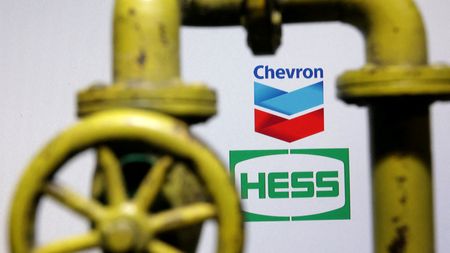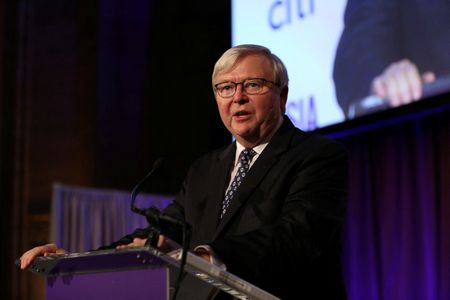By Arunima Kumar
(Reuters) -Exxon Mobil has lost its arbitration challenge to block Chevron’s $55 billion Hess acquisition deal, but the top U.S. oil producer managed to delay the tie-up by over a year, costing its rival billions in lost Guyana oil revenue and slowing integration.
Chevron’s deal, first announced in October 2023, closed on Friday after a drawn-out dispute over Hess’s 30% stake in Guyana’s Stabroek block, the most attractive asset in its portfolio. The offshore oilfield holds more than 11 billion barrels of oil and is one of the fastest-growing oil production regions in the world.
The No. 2 U.S. oil producer had originally targeted a mid-2024 close for the deal.
Exxon, which operates the Guyana project and holds a 45% stake along with Hess and CNOOC, challenged the merger through arbitration, citing a right of first refusal on Hess’s Guyana assets.
“The delay kept roughly 180,000 barrels per day (bpd) of Hess oil, about $6-7 billion in gross sales and $3 billion in profit, just from Guyana’s Stabroek Block sailing past Chevron’s till in 2024, because those barrels kept flowing to Hess while the lawyers argued,” said Michael Ashley Schulman, chief investment officer at Running Point Capital.
Chevron’s deal was part of the biggest wave of consolidation in the oil industry for over 20 years and was a strategic counter to Exxon’s own blockbuster deal and growing position in the Permian.
For Chevron CEO Michael Wirth, acquiring Hess and its stake in Guyana was central to his strategy for the company’s future growth.
That strategy had been in limbo during the arbitration, turning what was initially expected to be a clean, timely win for Chevron into a high-stakes challenge for Wirth, who had already lost one major deal.
He abandoned his takeover bid for Anadarko Petroleum in 2019 after being outmanoeuvred by Occidental Petroleum’s higher offer.
OVERHANG ON CHEVRON’S STOCK
With the Hess deal now closed, Chevron said it expects to realize $1 billion in run-rate cost synergies by the end of 2025 and will cut jobs due to overlapping roles between the two companies.
Chevron is in the midst of laying off up to 20% of its global workforce, has faced a rise in safety issues, and its operations in Venezuela have been caught in a geopolitical crossfire.
“For Chevron, this favorable ruling helps the major avoid other time-consuming (and likely costly) approaches for inorganic growth,” said Atul Raina, vice president at Rystad Energy.
“Had the ruling gone in favor of Exxon Mobil and CNOOC, Chevron would then have had to look for growth opportunities elsewhere … this would have most likely translated into Chevron paying large premiums for buying premier U.S. shale assets that move the needle for the major,” Raina added.
During the arbitration, Chevron had prepared for the integration of Hess business, purchasing $2.2 billion in Hess shares and issuing $5.5 billion in long-term debt, according to Jefferies analysts.
The arbitration itself was also costly, Schulman said.
“Add an estimated $50-100 million in arbitration fees and white-shoe billable hours, and you start to see why Mike Wirth’s victory lap feels a bit like winning the Indy 500 on three tires,” said Schulman.
By contrast, Exxon’s own $60 billion acquisition of Pioneer Natural Resources, announced the same month as Chevron’s deal, closed by May 2024. That deal gave Exxon a bigger position as a shale producer in the top U.S. oilfield, the Permian basin.
Since announcing the Hess deal, Chevron shares have declined about 9%. Exxon’s stock is up just over 1% since unveiling its Pioneer acquisition, a divergence reflecting investor sentiment around timing and execution. Some of that gap was closed on Friday as Chevron stock fell nearly 1% while Exxon fell nearly 3%.
RBC analyst Biraj Borkhataria said the arbitration had clearly been an overhang on Chevron’s stock, with many investors choosing to stay on the sidelines during the drawn-out process.
“Investor sentiment has shifted multiple times over the last eighteen months, usually based on either Exxon or Chevron commentary at industry conferences, both expressing how ‘confident’ they were of winning,” Borkhataria said in a note.
(Reporting by Arunima Kumar in BengaluruEditing by Marguerita Choy)











